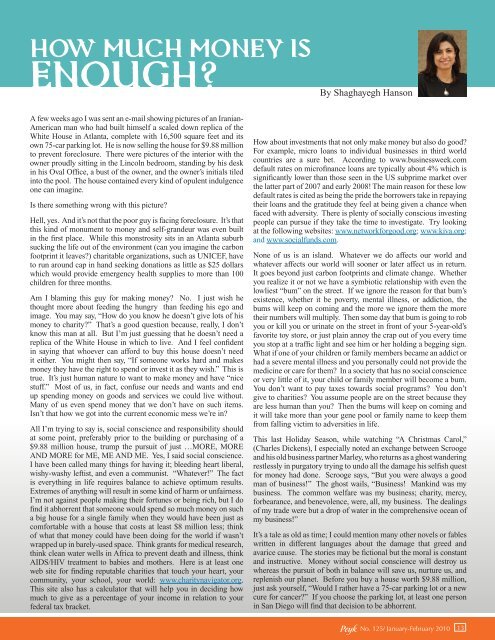English Section - Persian Cultural Center
English Section - Persian Cultural Center
English Section - Persian Cultural Center
You also want an ePaper? Increase the reach of your titles
YUMPU automatically turns print PDFs into web optimized ePapers that Google loves.
HOW MUCH MONEY IS<br />
ENOUGH?<br />
By Shaghayegh Hanson<br />
A few weeks ago I was sent an e-mail showing pictures of an Iranian-<br />
American man who had built himself a scaled down replica of the<br />
White House in Atlanta, complete with 16,500 square feet and its<br />
own 75-car parking lot. He is now selling the house for $9.88 million<br />
to prevent foreclosure. There were pictures of the interior with the<br />
owner proudly sitting in the Lincoln bedroom, standing by his desk<br />
in his Oval Office, a bust of the owner, and the owner’s initials tiled<br />
into the pool. The house contained every kind of opulent indulgence<br />
one can imagine.<br />
Is there something wrong with this picture?<br />
Hell, yes. And it’s not that the poor guy is facing foreclosure. It’s that<br />
this kind of monument to money and self-grandeur was even built<br />
in the first place. While this monstrosity sits in an Atlanta suburb<br />
sucking the life out of the environment (can you imagine the carbon<br />
footprint it leaves?) charitable organizations, such as UNICEF, have<br />
to run around cap in hand seeking donations as little as $25 dollars<br />
which would provide emergency health supplies to more than 100<br />
children for three months.<br />
Am I blaming this guy for making money? No. I just wish he<br />
thought more about feeding the hungry than feeding his ego and<br />
image. You may say, “How do you know he doesn’t give lots of his<br />
money to charity?” That’s a good question because, really, I don’t<br />
know this man at all. But I’m just guessing that he doesn’t need a<br />
replica of the White House in which to live. And I feel confident<br />
in saying that whoever can afford to buy this house doesn’t need<br />
it either. You might then say, “If someone works hard and makes<br />
money they have the right to spend or invest it as they wish.” This is<br />
true. It’s just human nature to want to make money and have “nice<br />
stuff.” Most of us, in fact, confuse our needs and wants and end<br />
up spending money on goods and services we could live without.<br />
Many of us even spend money that we don’t have on such items.<br />
Isn’t that how we got into the current economic mess we’re in?<br />
All I’m trying to say is, social conscience and responsibility should<br />
at some point, preferably prior to the building or purchasing of a<br />
$9.88 million house, trump the pursuit of just …MORE, MORE<br />
AND MORE for ME, ME AND ME. Yes, I said social conscience.<br />
I have been called many things for having it; bleeding heart liberal,<br />
wishy-washy leftist, and even a communist. “Whatever!” The fact<br />
is everything in life requires balance to achieve optimum results.<br />
Extremes of anything will result in some kind of harm or unfairness.<br />
I’m not against people making their fortunes or being rich, but I do<br />
find it abhorrent that someone would spend so much money on such<br />
a big house for a single family when they would have been just as<br />
comfortable with a house that costs at least $8 million less; think<br />
of what that money could have been doing for the world if wasn’t<br />
wrapped up in barely-used space. Think grants for medical research,<br />
think clean water wells in Africa to prevent death and illness, think<br />
AIDS/HIV treatment to babies and mothers. Here is at least one<br />
web site for finding reputable charities that touch your heart, your<br />
community, your school, your world: www.charitynavigator.org.<br />
This site also has a calculator that will help you in deciding how<br />
much to give as a percentage of your income in relation to your<br />
federal tax bracket.<br />
How about investments that not only make money but also do good?<br />
For example, micro loans to individual businesses in third world<br />
countries are a sure bet. According to www.businessweek.com<br />
default rates on microfinance loans are typically about 4% which is<br />
significantly lower than those seen in the US subprime market over<br />
the latter part of 2007 and early 2008! The main reason for these low<br />
default rates is cited as being the pride the borrowers take in repaying<br />
their loans and the gratitude they feel at being given a chance when<br />
faced with adversity. There is plenty of socially conscious investing<br />
people can pursue if they take the time to investigate. Try looking<br />
at the following websites: www.networkforgood.org; www.kiva.org;<br />
and www.socialfunds.com.<br />
None of us is an island. Whatever we do affects our world and<br />
whatever affects our world will sooner or later affect us in return.<br />
It goes beyond just carbon footprints and climate change. Whether<br />
you realize it or not we have a symbiotic relationship with even the<br />
lowliest “bum” on the street. If we ignore the reason for that bum’s<br />
existence, whether it be poverty, mental illness, or addiction, the<br />
bums will keep on coming and the more we ignore them the more<br />
their numbers will multiply. Then some day that bum is going to rob<br />
you or kill you or urinate on the street in front of your 5-year-old’s<br />
favorite toy store, or just plain annoy the crap out of you every time<br />
you stop at a traffic light and see him or her holding a begging sign.<br />
What if one of your children or family members became an addict or<br />
had a severe mental illness and you personally could not provide the<br />
medicine or care for them? In a society that has no social conscience<br />
or very little of it, your child or family member will become a bum.<br />
You don’t want to pay taxes towards social programs? You don’t<br />
give to charities? You assume people are on the street because they<br />
are less human than you? Then the bums will keep on coming and<br />
it will take more than your gene pool or family name to keep them<br />
from falling victim to adversities in life.<br />
This last Holiday Season, while watching “A Christmas Carol,”<br />
(Charles Dickens), I especially noted an exchange between Scrooge<br />
and his old business partner Marley, who returns as a ghost wandering<br />
restlessly in purgatory trying to undo all the damage his selfish quest<br />
for money had done. Scrooge says, “But you were always a good<br />
man of business!” The ghost wails, “Business! Mankind was my<br />
business. The common welfare was my business; charity, mercy,<br />
forbearance, and benevolence, were, all, my business. The dealings<br />
of my trade were but a drop of water in the comprehensive ocean of<br />
my business!”<br />
It’s a tale as old as time; I could mention many other novels or fables<br />
written in different languages about the damage that greed and<br />
avarice cause. The stories may be fictional but the moral is constant<br />
and instructive. Money without social conscience will destroy us<br />
whereas the pursuit of both in balance will save us, nurture us, and<br />
replenish our planet. Before you buy a house worth $9.88 million,<br />
just ask yourself, “Would I rather have a 75-car parking lot or a new<br />
cure for cancer?” If you choose the parking lot, at least one person<br />
in San Diego will find that decision to be abhorrent.<br />
No. 125/ January-February 2010 13

















